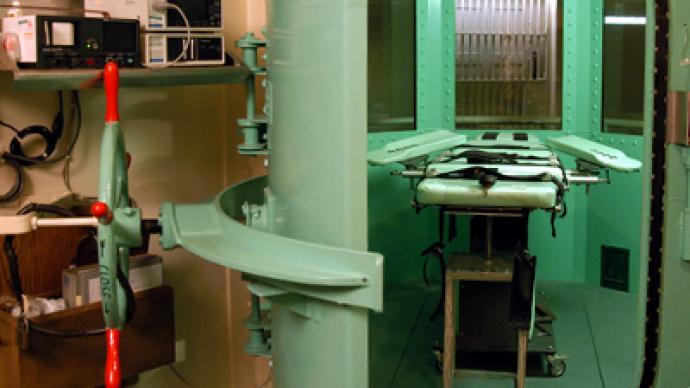EU bans export of execution drug to US

Sorry, Rick Perry. Your world-famous Texas executions might have to be put on hold for a little bit. One of the only exporters left of the death drugs used to kill American inmates is pulling the plug on sending shipments abroad.
The entire European Union is looking to put a halt on the export of certain barbituric acids starting at the end of this week, and among those impacted by the ban is sodium thiopental, the anesthetic used in the execution cocktail favored by many of the American states that still impose the death penalty.This news comes courtesy of the German newspaper Süddeutsche Zeitung, which first reported on the EU ban on Monday. The Official Journal of the European Union (OJ) is set to publish the new regulations on the export this week, with the ban formally taking effect this Friday. The United States has been scouring the globe for thiopental ever since Illinois-based pharmaceutical company Hospira stopped manufacturing it in January, ceasing domestic production entirely. While the drug is still being made in some international locales — and stockpiles exist across the US — the future of executions in America will surely be impacted by the ban.The United States has already executed 43 inmates in 2011. By April 1, 2012, another dozen are already slated to be killed. As supplies of sodium thiopental dwindle, however, replacing it with another drug would require a lengthy approval process which could complicate scheduled executions, which are already being in part delayed.While sodium thiopental has other uses, more and more countries are enacting embargoes of sodium thiopental on America as it becomes clear that the US is obtaining the drug only to bring upon death. The latest regulation come as a huge blow to the American killing industry but is not an outcome that has come from out of nowhere. Earlier this year, German Vice Chancellor Philipp Rösler denied a request from former US Commerce Secretary Gary Locke to obtain the drug. The Süddeutsche reports that Rösler, health minister of Germany when he rejected Locke’s plea, helped in part introduce the new regulations over the drug. Additionally, the CEO of a Switzerland-based pharmaceutical company also attacked American officials for using surreptitious means to obtain the poison. "I am shocked and appalled by this news," Prithi Kochhar of Swiss-based Naari AH, wrote to Nebraska's Supreme Court Chief Justice Michael Heavican. "I am writing to request that the thiopental which was wrongfully diverted … to the Nebraska Department of Correctional Services be returned immediately to its rightful owners, that is, that it be returned to us at Naari."Indian pharmaceutical company Kayem Pharmaceutical Pvt. Ltd. also recently stopped export of the drug for use in executions. “We thought exporting to the US will be good for us,” Kayem Managing Director Navneet Verma tells The Hindu. “We sold 500 vials of the drug to Nebraska and 500 to South Dakota, not knowing its end use. When we learnt it was being used for execution in US prisons it was a total bouncer. We issued a public statement announcing that we have discontinued selling it to the.,”Lundbeck, a Danish manufacturer of a related drug used in recent months for executions, pentobarbital, says on its website that it "will deny distribution of the product to prisons in US states currently active in carrying out the death penalty by lethal injection." Richard Dieter, executive director of the Death Penalty Information Center, tells the Lincoln Journal Star, however, that pentobarbital is still widely available in the states. To the World-Herald, Dieter adds, "If Nebraska just moves to pentobarbital, which is the typical next step, the state will probably soon face problems with that drug also."Around 11 states in the US have been attempting to purchase sodium thiopental from outside sources since Hospira ceased production, but the US Drug Enforcement Administration has largely seized stockpiles, citing imports conducted illegally. It is believed that 35 states in all use the anesthetic in one way or another to execute alleged criminals.














